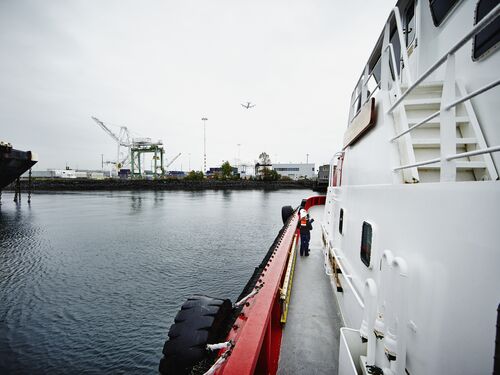NASA Should Update Policies That Protect Planets and Other Solar System Bodies During Space Exploration Missions, New Report Says
News Release
Last update July 2, 2018
Even before Sputnik began the spaceflight era, the international community expressed concern that space exploration could potentially contaminate other planetary bodies, thereby making it impossible to search for scientific evidence for life outside Earth. Likewise, samples of material returned from other bodies could pose risks to Earth. Therefore, planetary protection – to prevent harmful contamination of other celestial bodies or the introduction of possible extraterrestrial life to Earth’s inhabitants and environment – has been an important principle throughout the history of space exploration. Presently, developing planetary protection policy involves a process that flows between national and international policy formulation and national policy implementation.
“NASA has played a pivotal leadership role on behalf of the United States in developing successful planetary protection policies for more than five decades, and our recommendations are intended to help sustain that success in the future,” said Joseph Alexander, chair of the committee that wrote the report, and a private consultant in science and technology policy. “Soundly framed and executed planetary protection policies will play a critical role in ensuring that space exploration efforts will deliver unambiguous answers about the possibility of life elsewhere in the solar system.”
The committee recommended that NASA develop a strategic plan that would help manage planetary protection policy implementation, secure outside advice, envision future exploration missions that could have planetary protection implications, and set research and technology investment priorities.
Planetary protection policies are facing unprecedented challenges as NASA and other national and international space agencies move forward on missions such as Mars Sample Return and exploration campaigns to the icy moons of Jupiter and Saturn. NASA also does not currently have a planetary protection policy in place regarding human exploration to Mars, which could take place in the 2030s. Moreover, the current U.S. government process to oversee samples returned from Mars and elsewhere dates back to the Apollo era and is out of date. The committee recommended that NASA’s agency-wide planetary protection strategic plan prepare for the policy development challenges that sample return and human missions to Mars are creating, as well as revise or replace its provisions for engaging relevant federal agencies in developing protection policies for returned samples.
Private-sector space exploration activities are another reason why planetary protection policies need re-examination. The only commercial space missions that are currently required to undergo rigorous spacecraft decontamination procedures are those that might go to Mars, because Mars is the only body of current interest to private-sector entities that is potentially capable of harboring life. Moreover, there is no regulatory agency within the U.S. government with the authority to regulate space exploration by non-government entities. Legislation should be proposed that grants authority to an appropriate federal regulatory agency to authorize and supervise private sector space activities, the report says. The policy development process also should take into account the views of the private sector and increase its participation in international discussions of planetary protection policy.
The study was sponsored by the National Aeronautics and Space Administration. The National Academies of Sciences, Engineering, and Medicine are private, nonprofit institutions that provide independent, objective analysis and advice to the nation to solve complex problems and inform public policy decisions related to science, technology, and medicine. The National Academies operate under an 1863 congressional charter to the National Academy of Sciences, signed by President Lincoln.
Contacts:
Andrew Robinson, Media Relations Assistant
Riya V. Anandwala, Media Relations Officer
Office of News and Public Information
202-334-2138; e-mail news@nas.edu
Social Media:
Follow us on Twitter: @theNASEM
Follow us on Instagram: @theNASEM
Follow us on Facebook: @NationalAcademies
Copies of Review and Assessment of Planetary Protection Policy Development Processes are available at www.nap.edu or by calling 202-334-3313 or 1-800-624-6242. Reporters may obtain a copy from the Office of News and Public Information (contacts listed above).
THE NATIONAL ACADEMIES OF SCIENCES, ENGINEERING, AND MEDICINE
Division on Engineering and Physical Sciences
Space Studies Board
Committee on the Review of Planetary Protection Policy Development Processes
Joseph K. Alexander (chair)
Consultant in Science and Technology Policy
Alexander Space Policy Consultants
Tucson, Ariz.
John R. Casani1
Assistant Laboratory Director (retired)
Flight Project Office
Jet Propulsion Laboratory
Pasadena, Calif.
Leroy Chiao
Co-Founder and CEO
One Orbit, LLC
Houston, Texas
David P. Fidler
James Louis Calamaras Professor of Law
Maurer School of Law
Indiana University
Bloomington, Indiana
Joanne I. Gabrynowicz
Professor Emerita of Space Law
University of Mississippi, and
Editor-in-Chief Emerita
Journal of Space Law
Oxford, Miss.
G. Scott Hubbard
Adjunct Professor
Department of Aeronautics and Astronautics, and
Director Emeritus
Center for Excellence for Commercial Space Transportation
Stanford University
Stanford, Calif.
Eugene H. Levy
Andrew Hays Buchanan Professor of Astrophysics
Department of Physics and Astronomy
Rice University
Houston, Texas
Norine E. Noonan
Professor of Biological Sciences
University of South Florida
St. Petersburg, Florida
Kenneth Olden2
Former Director
National Center for Environmental Assessment and Human Health Risk Assessment Research Program
U.S. Environmental Protection Agency
Washington, D.C.
Francois Raulin
Professor Emeritus
Université Paris Est-Créteil
Paris, France
Gary Ruvkun2,3
Professor of Genetics
Department of Molecular Biology
Harvard Medical School
Massachusetts General Hospital
Boston, Massachusetts
Mark P. Saunders
Independent Consultant
Folly Beach, S.C.
Beth A. Simmons3
Andrea Mitchell University Professor of Law and Political Science
Department of Political Science
University of Pennsylvania
Philadelphia, Pennsylvania
Pericles D. Stabekis
Independent Consultant
Washington, D.C.
Andrew Steele
Senior Staff Scientist
Geophysical Laboratory
Carnegie Institution for Science
Washington, D.C.
STAFF
David H. Smith
Staff Officer
1Member, National Academy of Engineering
2Member, National Academy of Medicine
3Member, National Academy of Sciences
More like this
Discover
Events
Right Now & Next Up
Stay in the loop with can’t-miss sessions, live events, and activities happening over the next two days.
NAS Building Guided Tours Available!
Participate in a one-hour guided tour of the historic National Academy of Sciences building, highlighting its distinctive architecture, renowned artwork, and the intersection of art, science, and culture.

